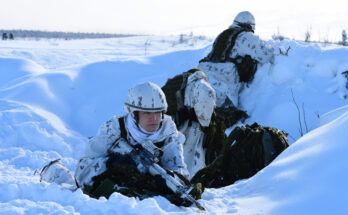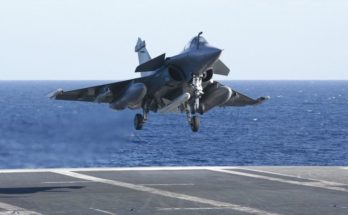by Dan Darling, International Military Markets Analyst, Forecast International.

The AgustaWestland WAH-64D Apache is a licence-built version of the AH-64D Apache Longbow attack helicopter for the British Army’s Army Air Corps. Photo: Peter Davies/MOD
A long-awaited move by the U.K. Ministry of Defence regarding attack helicopter capability has now played out, as a government-to-government request for the upgrade/remanufacture of the British Army fleet of WAH-64D Apaches was approved by the U.S. State Department.
The British Army has 50 Apaches currently in full operational service, this after the MoD opted to mothball some 15-16 others in January following the conclusion of the Operation Herrick combat deployment in Afghanistan at the end of 2014. With the Apache fleet facing component obsolescence issues in the near future, the MoD launched a Capability Sustainment Program (CSP) assessment to examine how best to maintain an attack helicopter capability out to 2040.
The British Army and MoD both favored the option of a direct purchase of new-build AH-64Es from Boeing to replace the D variants. Other options considered were an upgrade of the existing D models to the U.S. AH-64E standard, an upgrade to the AH-64E standard involving British-specific technologies, or technological improvements to the current AH-64D airframes.
The sticky part for British defense planners has remained the matter of cost. Delivery timelines are of course crucial, with the Army’s concern that delays in introducing a newer or reframed Apache model into service would result in the emergence of a capability gap between 2017 and 2020. But with the Conservatives not only winning the general election last May but attaining an outright majority, the question of budgets trumps all else. The government of Prime Minister David Cameron continues to focus on deficit reduction, leaving the MoD to seek value for money wherever possible.
Add to the mix a strong lobbying effort by AgustaWestland and suddenly the Apache capability sustainment waters were muddied. Under the original procurement of the British Army’s Apaches, the helicopters were license-built in the U.K. by AgustaWestland utilizing British components and subsystems. Since the CSP assessment was launched, AgustaWestland has lobbied hard to be involved in any future project, whether as producer under license once again or as a supplier of modification work.
For its part, Boeing offered to sell the U.K. new-build AH-64Es in flyaway condition at a price of GBP20 million ($31 million) per helicopter.
In the end, the MoD appears to have favored the remanufacture option, which involves stripping out select components from the AH-64D’s current systems and revamping them, while completely rebuilding the airframe for broadened mission use. It should be noted that the Foreign Military Sales (FMS) request announced by the Pentagon’s Defense Security Cooperation Agency (DSCA) to Congress on August 26 states that one additional mission type will involve counter-piracy, thus the so-called marinization of the existing British Apache platform for shipboard use.
Noticeable in the FMS request by the U.K. was cost – $3 billion for the remanufacture of 50 WAH-64D helicopters, or $60 million per unit – and the lack of work share for AgustaWestland. All contractors listed are U.S.-based. With Rolls-Royce no longer involved in manufacture of the older RTM232 engine installed on the original British Apache model, concerns over aiding local industry no longer appear to be a deciding factor. As for the remanufacture project’s higher unit price versus Boeing’s new-build offer, this will likely be negotiated down to a lower figure, particularly if the U.K. pools its effort with the U.S. Army’s multiyear purchase.
The DSCA notification now moves to Congress for approval – almost certain to be granted – before proceeding to the negotiating phase. So unless last-minute wrinkles emerge, the deal will likely move forward.
For 50 years, Forecast International intelligence reports have been the aerospace and defense industry standard for accurate research, analysis, and projections. Our experienced analysts compile, evaluate, and present accurate data for decision makers. FI's market research reports offer concise analysis of individual programs and identify market opportunities. Each report includes a program overview, detailed statistics, recent developments and a competitive analysis, culminating in production forecasts spanning 10 or 15 years. Let our market intelligence reports be a key part of reducing uncertainties and mastering your specific market and its growth potential. Find out more at www.forecastinternational.com




